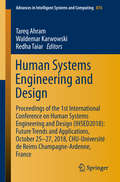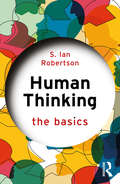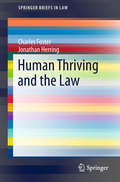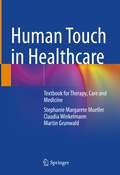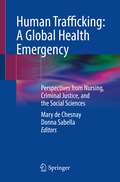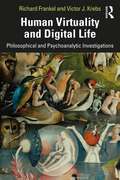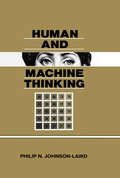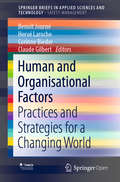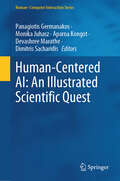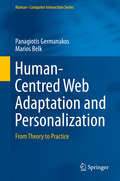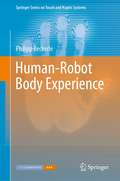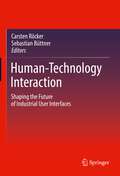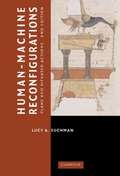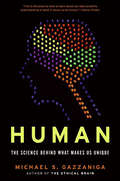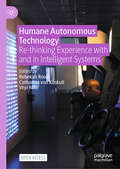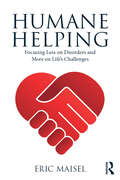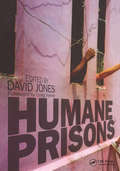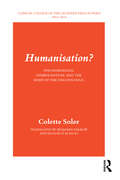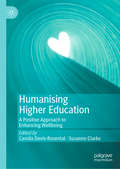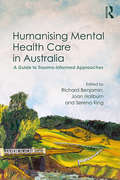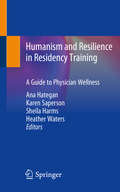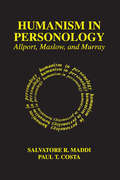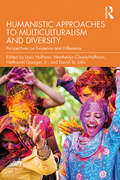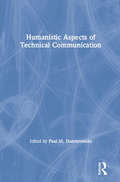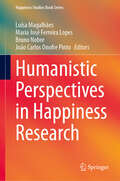- Table View
- List View
Human Systems Engineering and Design: Proceedings of the 1st International Conference on Human Systems Engineering and Design (IHSED2018): Future Trends and Applications, October 25-27, 2018, CHU-Université de Reims Champagne-Ardenne, France (Advances in Intelligent Systems and Computing #876)
by Waldemar Karwowski Tareq Ahram Redha TaiarThis book focuses on novel design and systems engineering approaches, including theories and best practices, for promoting a better integration of people and engineering systems. It covers a range of hot topics related to: development of activity-centered and user-centered systems; interface design and human-computer interaction; usability and user experience; cooperative, participatory and contextual models; emergent properties of human behavior; innovative materials in manufacturing, and many more. Particular emphasis is placed on applications in sports, healthcare, and medicine. The book, which gathers selected papers presented at the 1st International Conference on Human Systems Engineering and Design: Future Trends and Applications (IHSED 2018), held on October 25-27, 2018, at CHU-Université de Reims Champagne-Ardenne, France, provides researchers, practitioners and program managers with a snapshot of the state-of-the-art and current challenges in the field of human systems engineering and design.
Human Thinking (The Basics)
by S. Ian RobertsonHuman Thinking: The Basics provides an essential introduction into how we develop thoughts, the types of reasoning we engage in, and how our thinking can be tailored by subconscious processing. Beginning with the fundamentals, the book examines the mental processes that shape our thoughts, the trajectory of how thought evolved within the animal kingdom and the stages of development of thinking throughout childhood. Robertson insightfully explains the effectiveness of political slogans and advertisements in engaging shallow information processing and the effortful, analytical processing required in critical thinking. Delving into fascinating topics such as magical thinking in the form of religion and superstition, fake news, and motivated ignorance, the book explains the discrepancy between reality and our internal mental representations, the influence of semantics on deductive reasoning and the error-prone, yet adaptive nature of biases. Containing student-friendly features including end of chapter summaries, demonstrative puzzles, simple figures, and further reading lists, this book will be essential reading for all students of thinking and reasoning.
Human Thriving and the Law (SpringerBriefs in Law)
by Charles Foster Jonathan HerringThe idea of the Good Life – of what constitutes human thriving, is, implicitly, the foundation and justification of the law. The law exists to hold societies together; to hold in tension the rights of individuals as against individuals, the rights of individuals as against various types of non-humans such as corporations (and vice versa), and the rights of individuals individuals as against the state (and vice versa). In democratic states, laws inhibit some freedoms in the name of greater, or more desirable freedoms. The only justification for law is surely that it tends to promote human thriving. But what is the Good Life? What does it mean to live a thriving life? There has been no want of discussion, at least since the great Athenians. But surprisingly, since human thriving is its sole raison d’etre, the law has been slow to contribute to the conversation. This book aims to start and facilitate this conversation. It aims to: -make lawyers ask: ‘What is the law for?’, and conclude that it is to maximise human thriving -make lawyers ask: ‘But what does human thriving mean?’ -make judges and advocates ask: ‘How can a judgment about the best interests of a patient be satisfactory unless its basis is made clear?’
Human Touch in Healthcare: Textbook for Therapy, Care and Medicine
by Claudia Winkelmann Martin Grunwald Stephanie Margarete MuellerThis textbook presents the essential research findings on human touch and haptic perception in a concise manner for students and health professionals. Focusing on anatomical, neural and physiological as well as psychological, social and clinical aspects, the scope of this book ranges from the fetus in the womb to the older adult in need of care. The chapters can be read individually or consecutively, and cross-chapter content is indicated by chapter references. Key learning points are highlighted at the end of each section, and figures, illustrations, and references facilitate the learning process. The quality of the presented study results has been critically analyzed and only randomized controlled studies are reported, which gives the reader a critical representation of the current state of knowledge. The textbook also provides valuable suggestions for future research by noting blind spots in existing research, and by pointing to methodological challenges in the implementation of high quality studies. Hence, this textbook is not only a representation of current knowledge, but also an epistemological analysis of the research process. There has been a surge of research about the sense of touch in the past ten years, which is incorporated in this book. This textbook will be an invaluable tool for physiotherapists, occupational therapists, nurses and other health professionals in everyday professional life.
Human Trafficking: Perspectives from Nursing, Criminal Justice, and the Social Sciences
by Donna Sabella Mary De ChesnayThis book presents various forms of human trafficking, a growing trend in the exploitation of large numbers of people with concurrent public health, socio-cultural, and economic costs to countries burdened with the consequences of the COVID-19 pandemic. Edited by psychiatric-mental health nurses and an applied anthropologist, this volume covers all forms of human trafficking: sex trafficking, forced labor, forced marriage, baby trafficking, organ trafficking, child marriage, and child soldiers with a global public health and policy focus. As such, it fills a gap in human trafficking knowledge and is built on courses springing up around the United States in multiple disciplines. Medical, mental health, and social work interventions are included as well as information about programs with documented outcomes. Each chapter includes state of the art of knowledge with case studies illustrating specific focal ideas, discussion, questions and exercises in order to help readers retain and reinforce chapter material. This textbook will be useful in the disciplines of nursing, medicine, public health, social work, and policy making, as well as in disciplines in which human trafficking is a current interest, such as law, criminal justice, and education.
Human Virtuality and Digital Life: Philosophical and Psychoanalytic Investigations
by Richard Frankel Victor J. KrebsThis book is a psychoanalytic and philosophical exploration of how the digital is transforming our perception of the world and our understanding of ourselves. Drawing on examples from everyday life, myth, and popular culture, this book argues that virtual reality is only the latest instantiation of the phenomenon of the virtual, which is intrinsic to human being. It illuminates what is at stake in our understanding of the relationship between the virtual and the real, showing how our present technologies both enhance and diminish our psychological lives. The authors claim that technology is a pharmakon - at the same time both a remedy and a poison - and in their writing exemplify a method that overcomes the polarization that compels us to regard it either as a liberating force or a dangerous threat in human life. The digital revolution challenges us to reckon with the implications of what is being called our posthuman condition, leaving behind our modern conception of the world as constituted by atemporal essences and reconceiving it instead as one of processes and change. The book’s postscript considers the sudden plunge into the virtual effected by the 2020 global pandemic. Accessible and wide-reaching, this book will appeal not only to psychotherapists, psychoanalysts, and philosophers, but anyone interested in the ways virtuality and the digital are transforming our contemporary lives.
Human and Machine Thinking (Distinguished Lecture Series #Vol. 1992)
by Philip N. Johnson-LairdThis book aims to reach an understanding of how the mind carries out three sorts of thinking -- deduction, induction, and creation -- to consider what goes right and what goes wrong, and to explore computational models of these sorts of thinking. Written for students of the mind -- psychologists, computer scientists, philosophers, linguists, and other cognitive scientists -- it also provides general readers with a self-contained account of human and machine thinking. The author presents his point of view, rather than a review, as simply as possible so that no technical background is required. Like the field of research itself, it calls for hard thinking about thinking.
Human and Organisational Factors: Practices and Strategies for a Changing World (SpringerBriefs in Applied Sciences and Technology)
by Corinne Bieder Claude Gilbert Benoît Journé Hervé LarocheThis open access book addresses several questions regarding the implementation of human and organisational factors (HOF) so that recent improvements in industrial safety can be built upon. It addresses sources of frustration in senior management with high expectations of operational recommendations and disquiet on the part of HOF specialists struggling to have an impact on high-level decision making. The brief explores these issues with an emphasis on examples and lessons learned based on the experience of its authors, who come from different academic disciplines and various industrial sectors such as oil and gas, energy and transportation. It then offers some ways forward for a better consideration of HOF in hazardous companies with a view of promoting safety and facing challenges in a rapidly changing world.
Human-Centered AI: An Illustrated Scientific Quest (Human–Computer Interaction Series)
by Panagiotis Germanakos Monika Juhasz Aparna Kongot Devashree Marathe Dimitris SacharidisEmbark on a captivating exploration of human-centered computing and AI, where the convergence of technology and human interaction unveils a world of endless possibilities. In the age of wireless communication, pervasive computing, and the Internet of Things, the synergy between humans and machines has never been more profound. This book delves deep into the heart of this symbiotic relationship, shedding light on the intricate dynamics that define our digital landscape. From the humble human-computer communications, via simple interaction points, to the complex web of virtual networks, every aspect of this journey is meticulously examined. Through a lens of innovation and insight, we navigate within the complex terrain of user actions, individual differences, and algorithmic computations. At the core of our exploration lies a quest for understanding—a quest that transcends the boundaries of traditional research and ventures into the realm of cutting-edge technology. Special emphasis is placed on promoting original insights and paradigms, incorporating aspects derived from psychological theory and individual differences in adaptive computational systems and recommenders. Our goal is simple yet ambitious: by enhancing explainability, fairness, transparency, and decreasing bias during interactions, to empower users with greater control and understanding of the technologies that shape their lives. Through a blend of visual storytelling and specialized textual contributions, we invite you to join us on this extraordinary journey. Whether you're a researcher, practitioner, or enthusiast in the field of AI and human-computer interaction, this book offers valuable insights and perspectives. Prepare to be inspired, enlightened, and empowered through this transformative journey as we unlock the true potential of technology in service of humanity.
Human-Centred Web Adaptation and Personalization
by Panagiotis Germanakos Marios BelkThis book focuses on theimportance of adaptation and personalization in today's society and theupgraded role computational systems and the Internet play in our day-to-dayactivities. In this era of wireless communication, pervasive computing and the Internet of Things, it is becoming increasingly critical to ensure humans remain central in the developmental process of new technologies to guarantee their continued usefulness and a positive end-user experience. Organized into three clear parts - theory, principles and practice, a holistic approach to designing and developing adaptive interactive systems and services has been adopted. With an emphasis on distinct human factors, both basic and applied research topics are explored, extending from human-centred user models, driven by user's individual differences in cognitive processing and emotions, to the creation of smart interfaces that can handle the ever increasing volume and complexity of information to the benefit of the end-user. Human-Centred Web Adaptation and Personalization - From Theory to Practice is meticulously crafted to serve researchers, practitioners, and students who wish to have an end-to-end understanding of how to convert pure research and scientific results into viable user interfaces, system components and applications. It will serve to bridge the knowledge gap that still remains by suggesting interaction design and implementation guidelines for areas like E-Commerce, E-Learning and Usable Security.
Human-Robot Body Experience (Springer Series on Touch and Haptic Systems)
by Philipp BeckerleThis monograph presents innovative research regarding the body experience of human individuals who are using assistive robotic devices such as wearable robots or teleoperation systems. The focus is set on human-in-the-loop experiments that help to empirically evaluate how users experience devices. Moreover, these experiments allow for further examination of the underlying mechanisms of body experience through extending existing psychological paradigms, e.g., by disentangling tactile feedback from contacts. Besides reporting and discussing psychological examinations, the influence of various aspects of engineering design is investigated, e.g., different implementations of haptic interfaces or robot control. As haptics are of paramount importance in this tight type of human-robot interaction, it is explored with respect to modality as well as temporal and spatial effects. The first part of the book motivates the research topic and gives an in-depth analysis of the experimental requirements. The second and third part present experimental designs and studies of human-robot body experience regarding the upper and lower limbs as well as cognitive models to predict them. The fourth part discusses a multitude of design considerations and provides directions to guide future research on bidirectional human-machine interfaces and non-functional haptic feedback.
Human-Technology Interaction: Shaping the Future of Industrial User Interfaces
by Carsten Röcker Sebastian BüttnerDigitalization and automation are leading to fundamental changes in the industrial landscape. In the German-speaking countries, this development is often summarized under the term Industry 4.0. Simultaneously, interaction technologies have made huge developments in the last decades. The use of mobile devices and touch screens is ubiquitous, augmented and virtual reality technologies have made their way into the market and new interaction concepts have become established. While new interaction technologies offer new possibilities for organizing or executing work in the context of Industry 4.0, the transformation of industrial processes also creates a need for new work practices. This book sheds light on the interplay of Industry 4.0 and new interaction technologies. It presents selected research articles on the topic of Human-Technology Interaction in the context of Industry 4.0. Researchers from various disciplines present the current state of research with regard to future interactions with production environments to develop a common vision of how to design future interactions in the industrial domain. In this context, various topics are covered: a detailed overview on assistive systems for supporting manual work is given, including technological and design aspects as well as implementation strategies. Industrial use-cases for extended reality (XR) technologies such as augmented and virtual reality (AR and VR) are presented, also covering aspects of how to author content in XR environments. The role of new work practices is examined, for example, by presenting concepts of gamification and human-machine teamwork for supporting well-being. Finally, topics of trust and technology acceptance are discussed in the context of Industry 4.0. Given this broad perspective, a vision is sketched of how to design future human-technology interactions in a way that realizes their full technical and human potential.
Human-machine Reconfigurations: Plans And Situated Actions, Second Edition
by Lucy SuchmanThis 2007 book considers how agencies are currently figured at the human-machine interface, and how they might be imaginatively and materially reconfigured. Contrary to the apparent enlivening of objects promised by the sciences of the artificial, the author proposes that the rhetorics and practices of those sciences work to obscure the performative nature of both persons and things. The question then shifts from debates over the status of human-like machines, to that of how humans and machines are enacted as similar or different in practice, and with what theoretical, practical and political consequences. Drawing on scholarship across the social sciences, humanities and computing, the author argues for research aimed at tracing the differences within specific sociomaterial arrangements without resorting to essentialist divides. This requires expanding our unit of analysis, while recognizing the inevitable cuts or boundaries through which technological systems are constituted.
Human: The Science Behind What Makes Your Brain Unique
by Michael S. Gazzaniga“[A] shimmering new book . . . This is the place to look to learn about our best scientific understanding of what it means to be human.” —Steven Pinker, New York Times bestselling author of The Language Instinct and How the Mind Works“A cognitive neuroscientist at the University of California, Santa Barbara (and one of the inventors of the field), takes us on a lively tour through the latest research on brain evolution.” —The New York Times Book ReviewWhat happened along the evolutionary trail that made humans so unique? In his accessible style, Michael Gazzaniga pinpoints the change that made us thinking, sentient humans different from our predecessors. He explores what makes human brains special, the importance of language and art in defining the human condition, the nature of human consciousness, and even artificial intelligence.“As wide-ranging as it is deep, and as entertaining as it is informative . . . will please a diverse array of readers.” —Publishers Weekly, starred review “A rich testimony to the incredible accomplishments of the human brain in coming to understand itself.” —New York Sun“Truly engaging.” —CNBC.com“A savvy, witty guide to neuroscience today.” —Kirkus Reviews“Brilliantly written and utterly fascinating.” —Robert Bazell, Chief Science Correspondent, NBC News“Sweeping, erudite and humorous . . . If you are looking for one book that gives you a Cook’s Tour of the human brain, where it came from and where it is heading, this would be an excellent choice.” —Pittsburgh Post-Gazette
Humane Autonomous Technology: Re-thinking Experience with and in Intelligent Systems
by Virpi Roto Rebekah Rousi Catharina Von KoskullThis open access book takes a human-focused multidisciplinary look at the ways in which autonomous technology shapes experience, affecting human lives and ways of working in settings ranging from the arts, design, and service to maritime and industry. The book focuses on the humane, observing how technology can be designed and implemented in an ethical, human-centered way. Chapters in this book highlight factors that impinge on the humane and ethical, such as challenging questions of intellectual property rights, roles of humans, biases, and the uptake of other deviant human traits. Through delving into a range of dimensions and contexts from culture, the arts and design, to service, heavy industry and maritime, the contributors demonstrate that artificial intelligence and its related autonomous systems need to be understood holistically, as a system of systems, that should be working for the benefit of human present and future.
Humane Helping: Focusing Less on Disorders and More on Life’s Challenges
by Eric MaiselHumane Helping is a comprehensive, practical guide that helps clinicians shift their practice from the mental disorder-and-chemical fix and expert-talk models to a more humane, helpful model that increases their ability to help clients meet life’s challenges and reduce emotional distress. Chapters clearly explain the shortfalls of the current models and the advantages of Eric Maisel’s model and include case studies, reflection questions, and actionable steps. Written for helping professionals in mental health as well as practitioners from fields such as coaching and nursing, Humane Helping challenges current practices and provides helpers with the tools they need to more compassionately, effectively, and honestly serve their clients.
Humane Prisons
by David JonesBased on the popular courses run by the Centre for Evidence-Based Medicine in Oxford, and written by leading figures working in the field of evidence-based medicine, this workbook provides papers appropriate for the study of child health.
Humanisation?: Psychoanalysis, Symbolisation, and the Body of the Unconscious
by Colette SolerUnquenched desire, the dividing up of the drives, repetition, and symptom are the keywords for the effects that the unconscious, as deciphered by Freud, has on the body. Harmony is not on the agenda, but rather the discordance, unlinking, and arrogance of cynical jouissances. It seems that the discourse of capitalism is today increasing their deleterious consequences – with all of these demonstrative suicides, but also suicides as diverse as those of terrorists, Tibetan monks, those beleaguered by the capitalist enterprise, and all the hopeless of our time. Hence the question that Lacan posed concerning the possible "humanisation" of this denatured animal, about whom Freud did not hesitate to say that he is a wolf to man, even though he has always made community. What will the psychoanalyst say about possible solutions, he whose act excludes the call to norms of any kind? Humanisation? is the 2013–2014 volume of the annual seminar held by the author at the Clinical College of the Lacanian Field in Paris.
Humanising Higher Education: A Positive Approach to Enhancing Wellbeing
by Camila Devis-Rozental Susanne ClarkeThis book explores humanising practice within higher education (HE). It provides a fresh perspective by bringing together expert voices with empirical experience of humanising theory and practice in various areas of higher education, in order to influence and improve the way in which universities work.The book draws on Todres et. al’s humanisation framework, as well other relevant theories such as positive organisational scholarship, Vygotsky’s socio-cultural theory and socio-emotional intelligence. Topics include micro elements of humanisation such as transitions and the student experience, and macro elements such as the policy impact of humanising HE and sustainability. The authors demonstrate how a humanising approach can provide the catalyst for wider change and help to improve wellbeing in the community. This book offers an invaluable resource for scholars interested in teaching and learning in HE, and for HE practitioners and policy makers keen to develop a more human practice.
Humanising Mental Health Care in Australia: A Guide to Trauma-informed Approaches
by Joan Haliburn Richard Benjamin Serena KingHumanising Mental Health Care in Australia is a unique and innovative contribution to the healthcare literature that outlines the trauma-informed approaches necessary to provide a more compassionate model of care for those who suffer with mental illness. The impact of abuse and trauma is frequently overlooked in this population, to the detriment of both individual and society. This work highlights the importance of recognising such a history and responding humanely. The book explores the trauma-informed perspective across four sections. The first outlines theory, constructs and effects of abuse and trauma. The second section addresses the effects of abuse and trauma on specific populations. The third section outlines a diverse range of individual treatment approaches. The final section takes a broader perspective, examining the importance of culture and training as well as the organisation and delivery of services. Written in an accessible style by a diverse group of national and international experts, Humanising Mental Health Care in Australia is an invaluable resource for mental health clinicians, the community managed and primary health sectors, policy makers and researchers, and will be a helpful reference for people who have experienced trauma and those who care for them.
Humanism and Resilience in Residency Training: A Guide to Physician Wellness
by Ana Hategan Karen Saperson Sheila Harms Heather WatersThis book aims to help identify pre-existing adaptive traits and positive perspectives in resident trainees, while challenging those that are less adaptive by building a formal curriculum for medical education that focuses on the humanistic aspects of medicine. Humanism in medicine is threatened by the false narrative that good physicians are superhumans who do not have their own needs. Written by experts in the field, this book is designed to be a concise, integrated guide to resilience during residency training. Through this guide, trainees learn (i) the usefulness of psychotherapeutic strategies for their own stress management and well-being; (ii) techniques and strategies that are useful in the practice of medicine; and (iii) to consider lifestyle modifications to improve physical and psychological health and well-being, through identification of positive and negative lifestyle factors influencing physicians’ response to stress.Since it is designed for busy trainees and physicians, this volume meticulously provides easy-to-use, evidence-based learning tools and therapeutic techniques, including case studies, skill-building exercises, self-test questionnaires, illustrations, useful practice-reminder tips, and other features.Humanism and Resilience in Residency Training is an excellent resource for all medical trainees and professionals who need to incorporate humanism and resilience in their practice, both for accreditation requirements and for personal well-being. This includes medical students and residents, psychiatrists, addiction medicine specialists, family physicians, medical education professionals, hospitalists, nurses, and all healthcare providers
Humanism in Personology: Allport, Maslow, and Murray
by Paul CostaThrough analysis of the lives and theories of the three major exponents of humanism, Allport, Maslow, and Murray, the authors have marshaled some compelling arguments for an alternative to the extreme behaviorism of Skinner and the logical positivism of Freud. This work is a concise, clear synthesis of both broad theoretical positions and specifi c concepts that underlie humanistic psychology.
Humanistic Approaches to Multiculturalism and Diversity: Perspectives on Existence and Difference
by David St. John Louis Hoffman Heatherlyn Cleare-Hoffman Nathaniel Granger Jr.Providing an overview of essential topics in multicultural psychology, Humanistic Approaches to Multiculturalism and Diversity focuses on the intersection of humanistic psychology and multiculturalism, including history, theory, research, and practice. The authors examine the unique contributions of humanistic psychology to multicultural psychology on topics often ignored, such as cultural empathy and indigenous psychology and diversity. The book critiques and rectifies previous failures to adequately engage multicultural issues by providing methods for integrating multicultural psychology and humanistic therapy. Readers will find that each chapter advances scholarship through a dialogue with multicultural perspectives and builds a foundation for future scholarship and clinical practice. This book will be of great interest to mental health professionals interested in humanistic and existential psychology.
Humanistic Aspects of Technical Communication
by Paul. M. DombrowskiThis book has two audiences and purposes. The first audience comprises teachers of technical communication and graduate and undergraduate students, commonly from English programs and without technical backgrounds. The purpose for them is to introduce technical communication from the avenue of humanities with which many are familiar and allied. The book serves them as an adjunct to conventional textbooks. The second audience comprises scholars and practicing professionals already familiar with technical communication. The purpose for them is to provide a handy collection, with introduction, of significant essays on recent humanistic developments.
Humanistic Perspectives in Happiness Research (Happiness Studies Book Series)
by Luísa Magalhães Maria José Ferreira Lopes Bruno Nobre João Carlos Onofre PintoThis volume provides innovative perspectives on the scholarly connection between the humanities and happiness, and considers the narrative expressions of happiness and recent investigations about happiness, its metrics, and objective insights about human wellbeing. This volume relates intemporal humanistic values to views across social and behavioural sciences, and thereby covers a broad interdisciplinary frame, from philosophy, psychology, literary studies, to the communication sciences. The philosophers in this volume discuss the achievement of happiness through the cultivation of virtue, as well as the logic of the gift as an experience of personal fulfilment and the fact that happiness is inextricably linked to hope. Their chapters take on the approach of the permanent human struggle to generate global horizons of happiness and thus attain eternal bliss. Scholars from other fields of the humanities and communication sciences consider the positive messages of environmental happiness in virtual platforms, where the Homo digitalis finds happiness at the click of a button, often under the endorsement of celebrities, or under the visual fruition of playful objects. They also present the intertextual memory of happiness as a condition for humanistic research. Finally, this volume considers the sphere of education as the best place in which to apply the results of sustainable happiness measurement and research, and to realize this complementary, humanistic perspective on happiness research.
